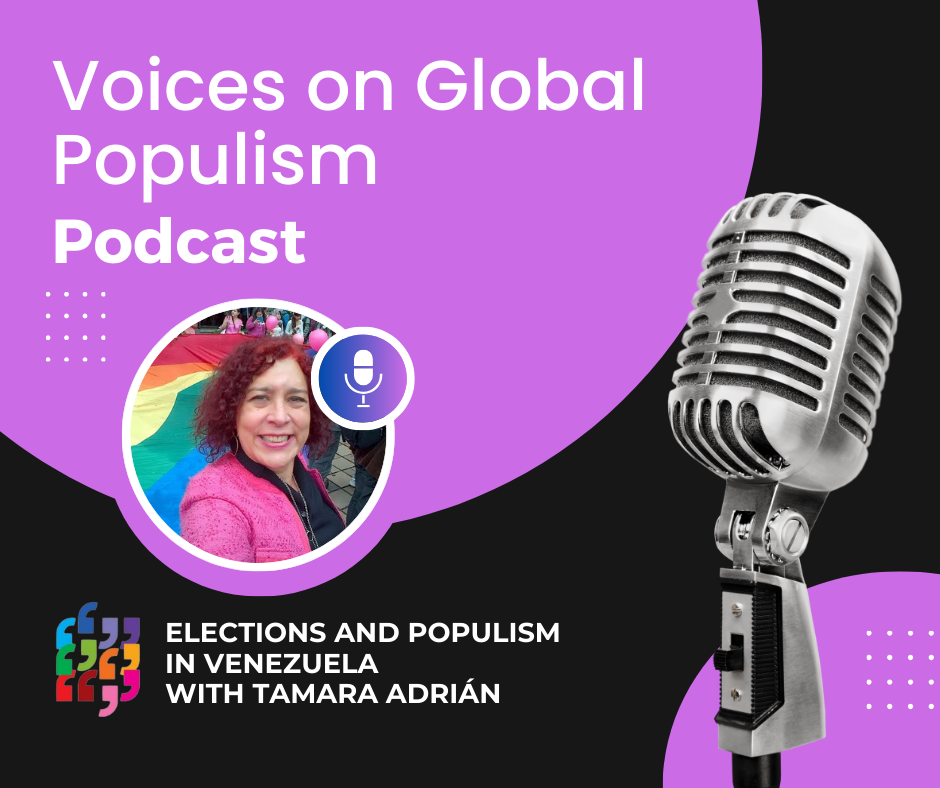With contested vote counts, repression, and international calls for transparency, Venezuela exemplifies the challenges faced by democracies in an era of rising populism. In this podcast we host Tamara Adrián, an opposition activist who offers unique insights into populist and repressive strategies employed by the Venezuelan regime.

In the first episode of the podcast series “Voices on Global Populism”, we explore Venezuela’s contested elections held this summer, analysing the populist strategies at play and their broader implications for global populist trends.
The episode focuses on the electoral process that Venezuela undertook in the last year. The contested election triggered widespread protests and a wave of government repression. The United Nations human rights investigators have accused Maduro’s government of orchestrating a brutal crackdown highlighting widespread violence, including the detention of minors, fatalities—and the targeting of protests and online critics. While González has an arrest warrant and has fled to exile in Spain, the crackdown continues today.
To discuss these dynamics, as well as the broader theme of populism in Venezuela, we hosted opposition activist Tamara Adrián. Since the early 2000s, Tamara has been a prominent figure in Venezuela’s political landscape. She is the founder and director of Diversity and Equality Through Law and her activism spans across Latin America and beyond. She has collaborated with the International Lesbian, Gay, Bisexual, Trans, and Intersex Association and served as a special adviser on human rights for both the Pan American Health Organization and the World Health Organization. Also importantly, she is Venezuela’s first transgender member of parliament.
Below are some of the core points she underlines in the podcast. To see the full episode click here.
“The Elections Were Not Fair”
Tamara has raised a critique of Venezuela’s recent elections and the political climate under Nicolás Maduro. While she acknowledged the elections were legitimate, she argued they were fundamentally unfair. She commended the impressive organization and commitment of citizens, who served as witnesses at voting centers, ensuring transparency by securing certified copies of results, safeguarded with advanced security features. However, the aftermath of the elections reveals a picture of repression and fear.
Repression and Political Prisoners
Following the elections, over 2,000 people were imprisoned for protesting or participating in opposition groups. Many detainees were denied basic rights such as legal representation, family visits, or fair trials, leaving them isolated. Tamara underlined that currently, 1,963 political prisoners remain, despite the release of some detainees after international pressure, notably from the International Criminal Court. Yet, many remain vulnerable to re-arrest.
She also highlighted the oppressive tactics of Maduro’s regime, such as “Operation Knock Knock,” which involved sudden arrests targeting dissidents or even their family members to force compliance. This climate of fear has driven 2,000–3,000 activists into hiding or exile. Over 100 opposition politicians, spanning the political spectrum, remain imprisoned.
Public Sentiment and International Response
According to Tamara, despite the suppression, public sentiment overwhelmingly opposes Maduro. Recent surveys she mentions show 87% of the population supports the opposition, and 90–92% believe opposition candidate Edmundo González won the election.
She also acknowledged the international community’s limited ability to pressure autocratic regimes like Maduro’s. While sanctions and diplomatic efforts have been employed, they have not yield significant results. She also noted the regime’s reliance on allies like Cuba, Russia, and Turkey, which help sustain its autocratic grip.
The Role of Populism and Militarization
Tamara described how the rise of Hugo Chávez was built on populist foundations which she argued were marked by oil revenues. However, declining oil revenues and economic mismanagement have eroded his ability to deliver such benefits. In the discussion we came to a conclusion that the regime now depends heavily on military loyalty, fear tactics, and international alliances.
The Road Ahead
Tamara argued that Maduro’s imminent swearing-in as president in January, backed by the military, could mark Venezuela’s full transition into autocracy. However despite the challenges, Tamara is determined to continue her activism. Inspired by historical figures like Nelson Mandela, she said, she believes in the power of action against injustice. “When you cannot accept the state of things, you have to act,” she said, underscoring her commitment to go on.
December, 2, 2024
Begum Zorlu
This conversation is part of a podcast series exploring the influence of populism on both global and domestic politics in an age of global disorder, where shifting alliances, economic instability, and geopolitical conflicts continue to reshape the political landscape. These evolving dynamics are crucial to understanding how populism shapes struggles for democracy, gender justice, and prospects for political change. It is a part of the author’s ESRC Postdoctoral Fellowship in partnership with the SES Equality and Solidarity Association.

